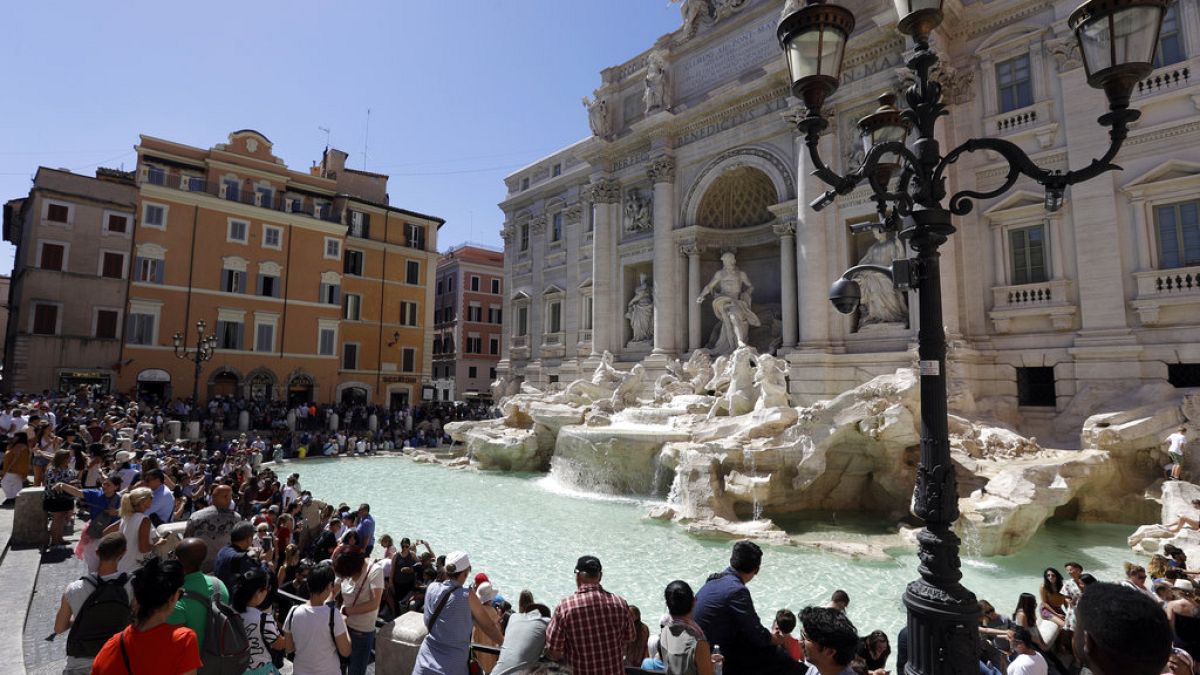Trevi Fountain tickets could soon be introduced in Rome

Access to the bucket list destination will be restricted in November to make way for maintenance works.
Rome could soon launch a ticketing system to enter one of its most iconic sites.
Authorities in the Italian capital say they want to start the scheme at the Trevi Fountain as part of ongoing plans to both reduce crowds and promote “sustainable tourism”.
The 18th-century fountain has long been a ‘must visit’ for tourists to the Eternal City, but it is frequently overcrowded and rife with pickpockets.
“Personally I would be in favour of looking at a new form of access, limited and timed, to the Trevi Fountain,” Alessandro Onorato, Rome’s city councillor responsible for tourism, told Italian newspaper Corriere della Sera.
If enforced, it would act as “a [ticket] reservation system – free for Romans and costing a symbolic €1 for tourists”, Onorato added.
Despite that cost, the city’s authorities say the goal of the charge is not to raise money, but to lessen and control crowds, while stopping them from “eating ice cream or pizza on a monument that deserves the proper respect.”
How likely is it that the Trevi Fountain plan will go ahead?
The fountain is one of the most visited attractions in Italy – and the wider world. That means it is frequently packed full of people who struggle to get a glance of the icon, designed by Italian architect Nicola Salvi.
While Onorato is keen to see the ticketing scheme in action, a spokesperson for the municipality told the AFP news agency that the proposal is merely “an initial idea – there is nothing concrete yet”.
“It is a delicate, difficult issue, but sooner or later it must be addressed,” the spokesperson added, “Tourism in Rome, which is reporting record numbers, must be made sustainable for the city and the environment.”
Rome sees on average 35 million visitors each year and that number is set to be higher still in 2025 as the Jubilee, a year-long religious event held in the city and the Vatican, is set to attract millions more.
Trevi Fountain access to be limited in November
Access to the Baroque fountain will be restricted next month while it is cleaned.
A fixed number of tourists will be granted access during the maintenance project, with a glass walkway constructed over the Trevi Fountain set to offer a unique view of the works.
City authorities say this will be used to better understand the flow of tourists to the monument, and will likely be a precursor to restricted access and an entrance fee being introduced in 2025.
Where else in Italy charges for entry – or is planning to?
If the Trevi Fountain fee did come into action, it wouldn’t be the first attempt in Italy to control crowds.
Earlier in 2024, Venice trialled a €5 ticket for day visitors arriving during peak periods, with the aim of encouraging people to come at less busy times. The trial had mixed responses from authorities and locals, but is likely to be repeated in 2025’s peak season.
Earlier this week, it was also announced that prime minister Giorgia Meloni’s government is considering raising Italy’s tourist tax to tackle overcrowding in busy cities, including Rome and Florence.
If that goes ahead, visitors staying in local accommodation overnight will have to pay up €25 (£21) a night per person.
That proposal has been met with anger by some leaders in hospitality, with a number suggesting it will damage the industry and put many people off visiting Italy altogether.
In the same vein, Onorato told the Corriere della Sera that authorities in Rome would ideally like to limit the opening of new Bed And Breakfast accommodation and holiday homes in order to reduce the pressure on the city’s historic centre.
Currently, though, they don’t have the power to do so: “Today we can limit the number of restaurants or fast-food outlets in the historic centre, but we cannot prevent the opening of non-hotel facilities.”
Related
Brits forced to pay fee to visit these 30 countries…
UK tourists will be required to pay a fee to visit 30 countries in Europe under new European Union (EU) travel rules.The rules mean British holidaymakers will n
The beautiful European island with just 148 locals
Irakleia is a beautiful island in the Minor Cyclades of Greece, nestled in the heart of the Aegean Sea and just an hour away from Naxos. Officially recorded t
Warning issued for Brits flying easyJet and Ryanair to popular…
Passengers flying with Ryanair, easyJet and British Airways should expect disruption (Picture: Urbanandsport/NurPhoto via Getty Images) Passenge










